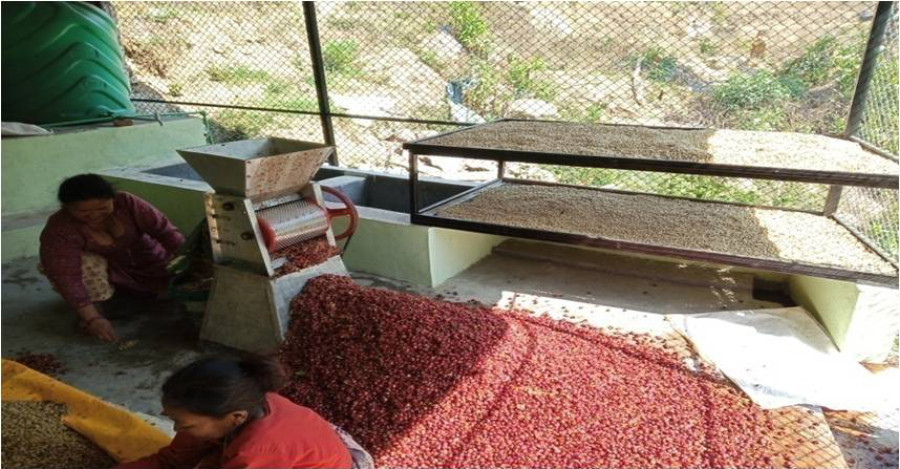Money
Sindhupalchok's coffee exports keep up despite pandemic
The district exported more than 7 tonnes this year to Australia, Japan and South Korea.
Anish Tiwari
Sindhupalchok's coffee exports continued without a hitch even while the rest of the economy including commerce lay crippled as Covid-19 shut down vital trade routes to China. Even after the highway linking the northern neighbour reopened, traffic was one way, and exports from Nepal remained stranded.
But shipments of organic coffee beans from Sindhupalchok to foreign countries were unaffected. The district, which lies northeast of Kathmandu adjacent to the Chinese border, exported more than 7 tonnes of coffee this year.
According to the Sindhu Coffee Cooperative Association, the coffee went to Australia, Japan and South Korea. Sindhupalchok produces 24 tonnes of coffee annually, and one-third of the production is shipped to foreign markets.
“Output dropped slightly this year due to pest infection. Farmers were largely worried when Covid-19 hit global trade,” said Manju Khadka, chairperson of the association. “But due to the organic content, the export of Sindhu coffee did not stop.”
The coffee acreage in Sindhupalchok totals 134 hectares, according to the National Tea and Coffee Development Board that works to promote coffee across the country.
Coffee farmers in Sindhupalchok say this year they received $9 per kg for green coffee beans, or natural coffee beans that haven't been roasted and remain completely raw. “There is big demand for Sindhu organic coffee in overseas markets,” said Khadka.
Germany is the largest buyer of Nepali coffee followed by Japan, the United States and the Netherlands.
According to the Department of Customs, Nepal exported 32 tonnes of coffee to different countries in the first five months of the current fiscal year. Nepali farmers grow 530 tonnes of coffee annually on 2,761 hectares. Exports amount to only 84 tonnes worth Rs100 million.
Various studies have shown that the coffee acreage can be increased to 1.1 million hectares.
Coffee is one of Nepal’s niche products that can be well marketed as an organic spice. Demand for Nepali coffee is high domestically and abroad due to its organic content, good quality, taste and aroma as the beans are grown in the highlands with almost no exposure to pesticides.
According to Khadka, organisations of foreign buyers like Beautiful Coffee in South Korea, Himalayan Organic Coffee in Australia and Coffee of Nepal in Japan have been buying coffee from Sindhupalchok.
Farmers receive Rs10 per kg from the profits generated from exports on top of the regular prices, the association said. Established a decade ago, the organisation has been working to commercialise coffee cultivation and promoting it as Sindhu Organic Coffee in foreign and domestic markets.
The Tea and Coffee Development Board in Nepal has certified its products as organic, the association said.
There are 12 cooperatives and 18 farmers groups engaged in commercial production of coffee in Sindhupalchok.
More than 2,000 farmers in Sindhupalchok grow coffee. According to them, a coffee plant can yield 10 kg of cherries. In the local market, the coffee bean is priced at Rs97 per kg.
Last November, the government hiked the minimum support price for coffee by 5 percent on average to reflect the higher cost of production.
Coffee farmers are paid Rs90 per kg for fresh cherry (A grade) coffee, up Rs5 per kg. ‘A’ grade coffee needs to be certified as organic. The price of ‘B’ grade coffee remains unchanged at Rs80 per kg. ‘B’ grade fresh cherry does not require organic certification.
The support price of parchment coffee has been hiked by Rs25 per kg to Rs450 per kg for ‘A’ grade coffee, and Rs397 per kg for ‘B’ grade parchment coffee.
According to the board, ‘A’ grade parchment coffee needs organic certification. The new prices came into effect on November 16. When the cherry ripens, its colour changes into a bright and deep red, which means it is ready for harvesting. The dried beans are known as parchment coffee.




 21.12°C Kathmandu
21.12°C Kathmandu














